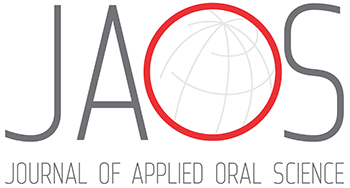The purpose of this study was to investigate the effect of different surface treatments on shear bond strength of saliva-contaminated resin-resin interfaces. Flat resin surfaces were fabricated. In the control group, no contamination or surface treatment was performed. The resin surfaces of the experimental groups were contaminated with saliva and air-dried, and then submitted to: (G1) rinsing with water and drying; (G2) application of an adhesive system; (G3) rinsing and drying, abrasion with finishing disks, etching and application of adhesive system; (G4) rinsing and drying, etching, application of silane and adhesive system. Resin cylinders were placed over the treated surfaces. The specimens were stored in water or ethanol. Shear bond strength tests were performed and the mode of failure was evaluated. Data were submitted to two-way ANOVA and Dunnett T3 test. Contamination of resin-resin interfaces with saliva significantly reduced shear strength, especially after prolonged storage (p<0.05). Similar values to the original bond strength were obtained after abrasion and application of adhesive (G3) or etching and application of silane and adhesive (G4). If contamination occurs, a surface treatment is required to guarantee an adequate interaction between the resin increments.
Composite resins; Saliva; Contamination; Ethanol; Water


